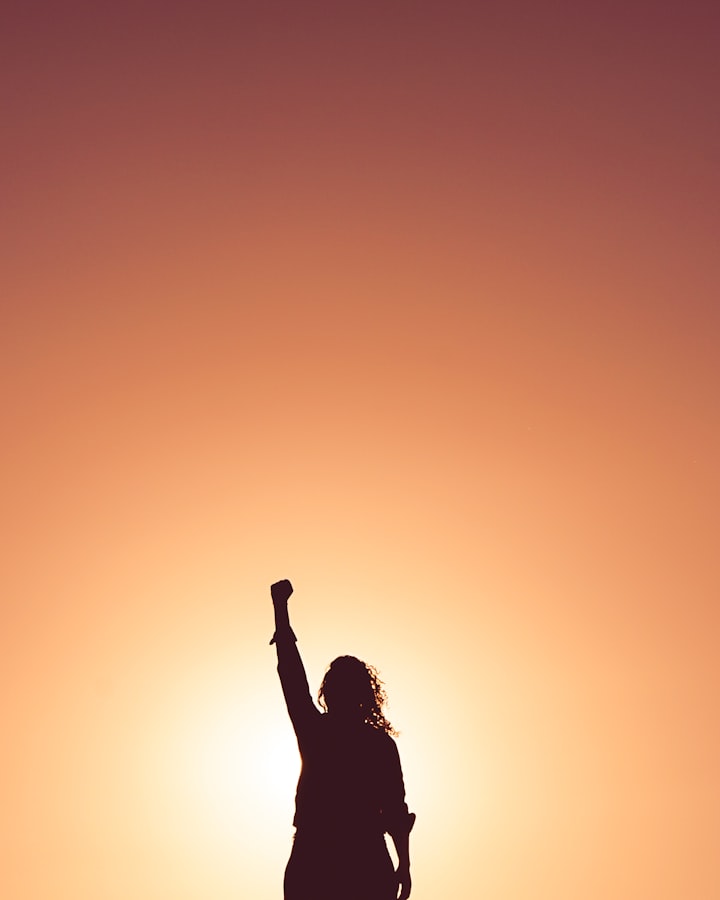How to Turn a Pandemic into a Tool for Success
Not that it's easy, but it's do-able!

When the Covid-19 pandemic began over a year ago, I walked into it with mental health challenges such as anxiety, depression, and post-traumatic stress disorder. Without going into all the morbid details we all remember, it didn't take long for me to discover that a lot of us were dealing with the same issues: weight gain, exacerbated depression and anxiety, and unprecedented stress that caused physical repercussions like fatigue, headaches, and sleeplessness. It seemed that while the virus began to rage through the country, our avoidance of it began to rage against us as well, myself included.
I remember reading from a friend's social media that those of us who entered the pandemic with a long past of anxiety and depression issues actually seemed to be dealing with the changes better than most because we were already conditioned to be worried constantly; the theory was that the worry about something very real, right in front of us, was easier to face because we understood it as real. When anxious or depressed, we tend to get upset over situations we have no evidence even exist in the way we think they do. With Covid-19, we were handed concrete concerns, and everything made sense to worry about.
Wishing I felt that way, I went to bed that night and couldn't stop thinking about the theory. If others with similar mental health challenges like mine were finding a way to make the pandemic more approachable, perhaps I could start viewing my concerns in a slightly less stressful way and utilize my years of "training" for severely emotional experiences. That was, essentially, step one to turning a pandemic into my own personal weapon against my demons.

Adjust Your Perspective Without Expectations of Perfection
I stopped worrying so much about everything I usually worried about and focused on what I could worry about that was (somewhat) in my control. Of course, this included the standard pandemic worries that I could manage: obtaining proper cleaning supplies, wearing masks, washing the masks regularly, sanitizing grocery bags, and so on. I grew focused on the tasks, and the tasks became my focus for a new routine. In the meantime, however, I suffered bouts of depression between moments of confident task completion that caused me to overindulge in food while reflecting on the horrible memories of what social distancing, mask-wearing, and signs everywhere with information, rules, and warnings felt like. The adjustment was difficult for me, as it all felt very apocalyptic and my best at that point was completing basic, thoughtless tasks like cleaning and employing safety measures for my family of six. How were we going to survive?
Our health was our priority, and I established this with my partner as well as myself. We laid out further guidelines to ensure safety, which put me in the leading role of all essential outings in order to minimize potential exposure. This meant that my role required me to be at my personal best, so the decision was clear to me at that point: I wanted to make healthier choices that benefited the body I was preparing for a pandemic war.

How I Decided to Just Change Myself in Small Doses
From experience, I knew that every attempt I'd ever made at a healthier lifestyle had failed miserably within the first week or two, and I can't even promise that I had ever made it a full two weeks when I'd tried to change my habitual decisions regarding food, hydration, and mental wellness. My best friend was also making healthier decisions at the time and gave me the best piece of advice I'd ever heard: "Don't think about it as a diet. The word 'diet' is negative and it will be harder to dedicate yourself to it if you feel bad about it. Call it a lifestyle change instead. The way you think about it has a huge impact on how successful you are."
I'm pretty sure she'll tell me I paraphrased that heavily, but that was her essential point.
This mentality epiphany set me forth on my journey more dedicated and thoughtful than I'd ever been before. I decided that my changes would happen at a fair pace, where I would shed pounds slowly and carefully but in as active of a lifestyle as I could manage being under a stay-at-home order. My partner bought a pedal exerciser to keep under his art desk, and I started small by pedaling for fifteen minutes at a time. I didn't pedal every day; I even went whole weeks between fifteen minute sessions, but the point wasn't consistency yet. The point was to introduce myself to this change at a pace I wouldn't judge myself for on any level. The less negativity I had, including toward myself, the better.

This same concept applied to food. I decided to ditch soda first, but to ease the process, I switched to diet soda. Due to unfortunate stomach issues, I cannot handle black coffee, so the diet soda remained after I dropped six pounds in my first week off the full blown sugar bombs as my source of caffeine. Eventually, I decided that having some sugar free soda would be the one selfish thing I'd keep for me, so I didn't feel like I lost everything I enjoyed.
After the soda change, I worked on food switching and experimented with various low-carb options to replace some starchy favorites until I established a good base of creations that were good for me and exciting for my snobbish taste buds that seek complex texture and flavor combinations (many of which had to be eliminated for a healthier approach to eating.) Without detailing every food transition, I can summarize that substituting low-carb tortillas for anything that can go on bread has been a majorly enjoyable transition, along with finding new fondness for a lot of new flavors and textures in the low-carb world.
I should note that I am not, by any means, trying the keto lifestyle. However, I certainly borrowed some ideas from it!
I involved my partner. I reminded him that it takes thirty days to form a habit, and that I just needed to get a whole month into new eating habits before it became second nature. Within six months, I lost fifty pounds.
This pandemic has had nothing on me. Well, maybe a little on me, but I found a way to grab hold of it and forge it into my own weapon, and that had me feeling pretty good. Unfortunately, it didn't fix everything; the depression and anxiety were still raging inside of me and, finally, bursting out of my skin like furious flames that somehow learned how to scream.
I sought a TeleHealth appointment with my physician to discuss my options for a better "me." My physical health would be nothing if my mental health didn't improve with it.

What's Right for You Isn't Right for Everyone
When I spoke with my doctor, I expressed to her that therapy had never been of much assistance in the past because of the personality I have: I am uncomfortable with opening up the darkest parts of my heart with an essential stranger, and I had no interest in setting up appointments where I could be overheard by my isolated family. The last thing I needed was my kids becoming aware that Mom was suffering as much as she was.
For me, the choices were acupuncture or medication, and I opted to try medication. We discussed concerns of side effects I'd experienced in the past, medications I had tried before, and chose one together. When I hung up, I sobbed in relief in my partner's arms because I truly felt hopeful that more would go right for me.
I must stress that this part of my "how to" is not required, because this step is not for everyone. If therapy has worked in the past and you know it has, reach out for that! If acupuncture did wonders, call them up and schedule an appointment! This is just my story; yours will be amazing as long as you choose what's right for you. Examine yourself in a critical manner and understand your needs as you make this choice, but don't limit yourself either. You should experiment with anything you believe could help, even if it doesn't end up working out.

I Figured it Out!
As if some kind of deity were having mercy on me, the first medication we tried worked well. For those who do well with medications to assist in anxiety, depression, and/or post-traumatic stress disorder, you'll understand when I say that I finally felt like the "me" I was supposed to be. I grew positive, enthusiastic, and more active than ever. I threw myself into betterment in every aspect of my life, because feeling good after such a long, tiring battle was a high I never wanted to end. I probably drove my partner insane telling him over and over just how great I felt about all kinds of changes I felt happening inside of me. Not just physical and mental health experiences, but a true growth in my heart and soul. Something in me felt changed forever in the best way.
I figured it out for me. I used my overthinking as a tool to understand my needs, I grasped determination out of sheer desperation to get back to a happier way to live, and I made it happen. I chose the right support system of my best friend and my partner as well as readjusting my perspectives and philosophies on becoming physically and mentally well. I created a plan of approach that worked for me and didn't overwhelm me with too vast of a change.
It feels great to succeed, and I wanted to share this because I think so many more of us can do this before this pandemic is over. We are all blacksmiths for the armies against our personal difficulties, and we can forge this pandemic into weapons against them all. Let the battle begin!
About the Creator
Dani Banani
I write through the passion I have for how much the world around me inspires me, and I create so the world inside me can be manifested.
Mom of 4, Birth Mom of 1, LGBTQIA+, I <3 Love.






Comments
There are no comments for this story
Be the first to respond and start the conversation.